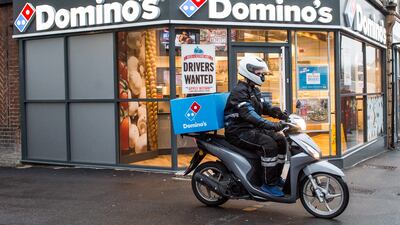Britain’s consumer spending rose 5.9 per cent in 2021 compared to pre-pandemic levels in 2019, driven by a shift towards online shopping and experiences at home.
Spending on “insperiences” – the consumption of in-home products and services, such as takeaways – was the big trend of 2021, jumping by 62 per cent over the 12 months.
In a signal of long-term durability, digital subscriptions rose 47 per cent as people stayed at home during the Covid-19 crisis, according to credit card provider Barclaycard, which see about half of all credit and debit card purchases in the country.
The data underscored the shift away from shopping in high street stores during the pandemic, with online retailers receiving a 62 per cent uplift in sales, compared with brick-and-mortar shops.
“2021 was another challenging year, as the pandemic continued to hamper the UK economy,” said Jose Carvalho, head of consumer products at Barclaycard.
“However, categories such as local food retailers, takeaways and digital entertainment continued to do well, thanks to Britons’ demand for convenient, local, and at-home shopping experiences.
“In addition, with more time spent working from home, Britons continued to invest in their households, resulting in strong growth for both DIY and pet stores,” he said.
British households built up their savings to almost record levels at the start of this year, when the Covid-19 lockdown in England and tighter restrictions in other parts of the country limited opportunities to spend.
The saving ratio – the amount of money households have available to save as a percentage of their total disposable income – rose to almost 20 per cent from 16 per cent in the three months to the end of December 2020.
This was the second-highest level since records began in 1963.
It meant households started 2021 with money to spend with the lockdown at the start of the year, encouraging them to splash out on goods and experiences close to home.
Consumers also brought more pets into their homes, resulting in a 29.1 per cent jump in spending on vets and pet retailers.
Britons also stayed close to home for their holiday, with the boom in staycations helping UK hotels and resorts bounce back in the summer, with 3.7 per cent growth in June and a 15.9 per cent uplift in August.

Even when non-essential stores began to reopen and restrictions eased, consumers still focused on speed and ease and staying close to home.
Food and drink specialist stores, including butchers, greengrocers and meal-kit providers, saw particularly strong growth over the year – up by 74 per cent – as consumers relied on the convenience of local stores and delivery services for meals.
Another gainer in the insperience economy was electronics, which saw a 10.3 per cent rise in spending on items such as games consoles.
Meanwhile, with spending in the hospitality and leisure sectors down 18.5 per cent compared to 2019, sports and outdoor retailers gained from the reopening of gyms and golf clubs with the category up 21.9 per cent.
“It is encouraging to see that many categories have enjoyed growth in what has been another turbulent year,” said Clare Bailey, founder of the Retail Champion consultancy.
“Local shops continue to be supported by community-spirited Britons, while sports, clothing and health and beauty retailers all saw uplifts as the nation enjoyed post-lockdown life.”
The road ahead is less rosy for consumers, with British households facing “the year of the squeeze” in 2022 as soaring energy bills, rising taxes and high inflation eat into incomes.
Real wages will effectively stagnate next year, rising just 0.1 per cent, with families set to be £1,200-a-year worse off from April when a price cap on energy bills is raised and a tax increase comes into effect, according to the London-based Resolution Foundation think tank.
“Consumers and businesses are capable of adapting to and overcoming immense hardship,” Mr Carvalho said.
“I’m optimistic about the year ahead.”


